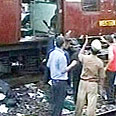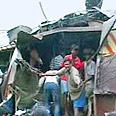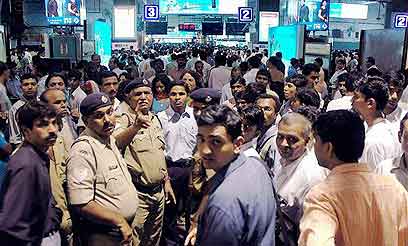

Scores killed in Bombay bombings
Seven explosions rock India's commuter rail network during Tuesday's evening rush hour, ripping apart train compartments and reportedly killing at least 160 and injuring 439, Bombay police say. Officials claim terrorists were behind attacks. No Israeli casualties have been reported
Eight explosions ripped through packed commuter trains during rush hour Tuesday in India's commercial capital, killing nearly 160 people and injuring another 439 in what officials said was a well-coordinated bomb attack by terrorists.
India's major cities were put on high alert after the blasts, which appeared timed to impose maximum carnage in the bustling city of 16 million. Its crowded rail network - carrying more than 6 million people a day - was thrown into chaos by the blasts and authorities were struggling to determine the impact.

Bombay blasts (Photo: AP)
The Israeli consul general in Bombay, Danny Sivan, reported to the Foreign Minister's Situation Room that no Israeli casualties have been reported so far. He said that representatives of the Israeli mission are in contact with the Indian authorities in order to find out whether Israelis were hurt in the bombings.
As the death toll rose through the night, officials gave out different - and sometimes conflicting - figures, often within minutes of each other.
Vilasrao Deshmukh, the chief minister of Maharashtra state, where Bombay is located, corrected initial reports of seven blasts, saying there had been eight explosions, including two at one station. Police said all explosions were aboard trains, some of which were in stations while others were moving down the tracks.
Bombay Police Chief A.N. Roy said the focus was on making sure that the injured received treatment. "We are busy in the rescue operation. Our first priority is to rescue the injured people," He said. However, heavy monsoon downpours were hampering the effort, which was continuing even as night fell.
'Terrorists behind attacks'
Witnesses reported seeing body parts strewn about stations, and Indian television news channels broadcast footage of bystanders carrying victims to ambulances and searching through the twisted wreckage for survivors and bodies.
Some of the injured were seen frantically dialing their cell phones. The mobile phone network collapsed adding to the sense of panic.
Indian Prime Minister Manmohan Singh called an emergency Cabinet meeting, and said that "terrorists" Were behind the attacks. Home Minister Shivraj Patil told reporters that authorities had "some" Information an attack was coming, "but place and time was not known." "The official information is that these are bomb explosions," the minister said.
Police were also reportedly carrying out raids across the country following the explosions, presumably in search of suspects. One television report said a suspect was in custody in New Delhi.
A senior Bombay police official, P.S. Pasricha, said the explosions were part of a well-coordinated attack. The force of the blasts ripped doors and windows off carriages, and luggage and debris were strewn about, splattered with blood. Survivors were seen clutching bloody bandages to their heads and faces. Some were able to get up and walk from the stations.
Hospitals were scenes of chaos and doctors were appealing for Bombay citizens to donate blood. One man, bloody bandages over his eyes, held out a phone to a nurse begging her to call his wife and tell her he was all right.
"I can't hear anything," said Shailesh Mhate, a man in his twenties, sitting on the floor of Bombay's Veena Desai Hospital surrounded by bloody cotton swabs. "People around me didn't survive. I don't know how I did," he said holding his head in his hands.















